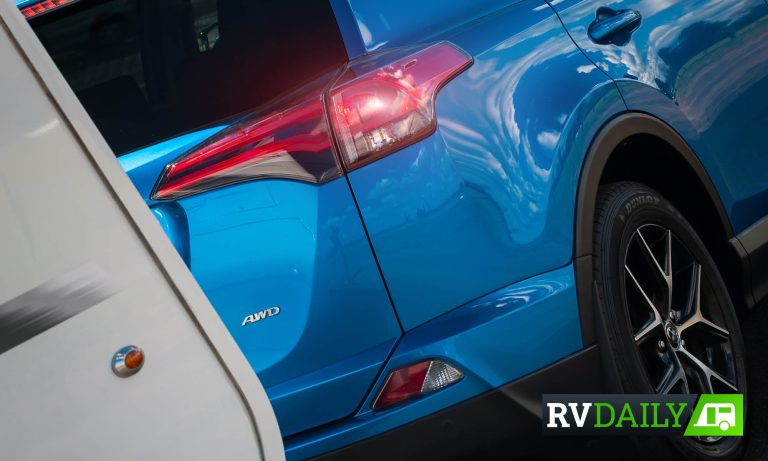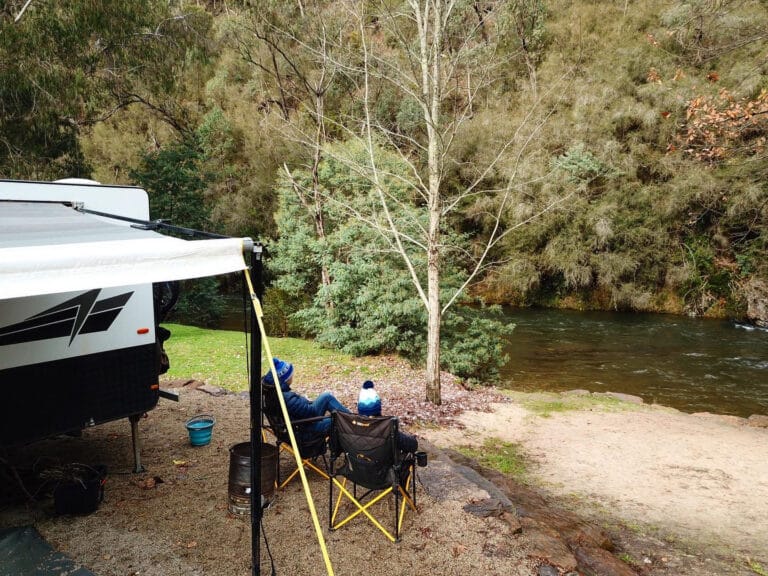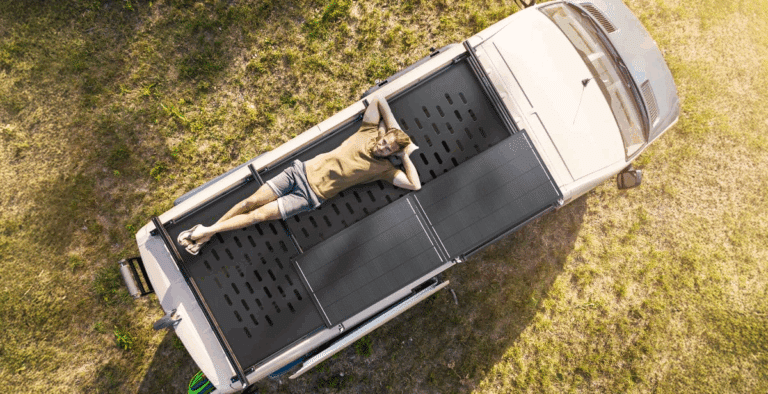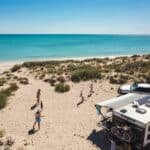We walk you through the options
WORDS & images PHILIP LORD
Most of us are interested in things like towing performance and fuel consumption but barely give the towing vehicle’s brakes a thought. Let’s face it, no caravanner likes to think about hauling up their rig in a full-on emergency braking situation or brake failure heading down a mountain pass.
Yet it can and does happen. Whether it’s another vehicle crossing our path, wildlife making a beeline for the front of the rig, or a descent that is longer and steeper than we first thought.
While high-performance brakes will get a lot more use in a performance car used on track days, it doesn’t mean that there are no benefits from having high-performance brakes on a tow vehicle. You don’t have to go to quite the same extent as a modified track day car though; there are a few relatively cheap and effective ways to make incremental improvements to your vehicle’s brakes. But first, you need to ensure that the system you already have is in top shape.
Flushing the brake fluid with fresh, high-quality brake fluid every 12 months is a good idea if you spend months of the year out touring with your van. Brake fluid is hygroscopic, meaning it tends to absorb moisture. When it does, the brakes become less effective as the fluid boiling point is reduced and the system becomes prone to corrosion and damage.
The rest of the system has to be top-notch too; that means that before you go out on tour with your van, you don’t want a tow vehicle with brake pad material down to the backing plates or warped brake discs.
Even though we’re focusing mostly on tow vehicle brakes, it goes without saying that good caravan brakes will have a huge influence on your rig’s stopping power. Checking that there’s plenty of brake lining material on the drum brake shoes and that magnets are not worn before you head off is a good idea. Take time on a quiet road to set up the electric brakes as per the electric brake controller manufacturer’s instructions. Always check that the caravan’s brakes are working as they should after you’ve hitched up – if the pins in the trailer plug have closed up, your trailer brakes will not work.
When towing you have to preserve the brakes, something you’d rarely worry about when driving without the van. Watch for signs advising a steep descent ahead, and be prepared for it. Slow down, setting your speed before starting the descent – don’t barrel into it, expecting that you can just wash off speed on the first part of the hill or you’ll heat up the brakes, which can eventually lead to brake fade. Be particularly smooth when descending a steep hill; don’t ride the brakes and, if you’re in a manual transmission, use a low gear so that the engine can do most of the braking.
The easiest, cheapest and most effective brake upgrade is to change the disc pads to heavy-duty semi-metallic pads. The semi-metallic pads disperse heat and resist brake fade better than standard, organic pads and last longer too. The negatives are that, compared with organic pads, semi-metallic pads give off more brake dust and create more noise; they’re also harder on brake rotors.
After pads, you hit the law of diminishing returns with brake upgrades. In fact, some argue that there is no return on the investment.
Slotted rotors are one of these potential brake improvements. Slotted rotors are said to improve gas dissipation. The theory goes that on standard rotors, gas from the brake pad material builds up between the rotor and pad, diminishing braking performance; slotted rotors offer a path for these gases to escape. Slotted rotors won’t stop your rig more quickly but proponents say that they will help avoid brake fade during plenty of application such as when heading down a mountain pass. They can, however, increase brake pad wear, brake dust and noise, and detractors say that they only decrease the rotor contact area, therefore reducing braking and encouraging heat.
Cross-drilled rotors only have benefits for cars used on the track, and even then, there are those who say they don’t work. There seems little point investing in these rotors for towing.
Stainless-steel braided brake lines are supposed to give better brake feel and stronger braking performance because they don’t swell like reinforced rubber lines can as they age. The theory goes that with braided lines, all the braking force is channelled to the brake caliper, rather than some being lost to a ballooning brake line. As with performance rotors, the jury is out on the efficacy of braided brake lines.
Lastly, there’s the option to modify the vehicle with better brakes. With a front brake caliper upgrade from single-piston to twin-piston calipers, the theory goes that you get a more consistent brake pedal feel and potentially the ability to stop the rig more quickly.
The key advantage for the bigger brakes is the larger pad surface area of a twin-piston caliper design, which allows better heat transfer and therefore less fade. Such a brake kit is available for only relatively few vehicles and is expensive – and may well need an engineer to sign-off on the modification.
The other modification is to replace rear drums (if your vehicle has them – they have become rare in new vehicles) with discs. This is a big job that will need an engineer’s certificate and is unlikely to improve braking when towing.
As for the caravan, there is one modification that will enhance a rig’s braking performance. An electro-hydraulic disc-brake system will outperform an electric drum brake system any day. The problem is that, like a twin-piston brake set-up, such a modification is very expensive.
Even though it’s unclear whether some brake ‘upgrades’ will actually do what the maker claims, it is clear that adding semi-metallic brake pads to a well-maintained and well set-up braking system will improve your rig’s stopping power.












